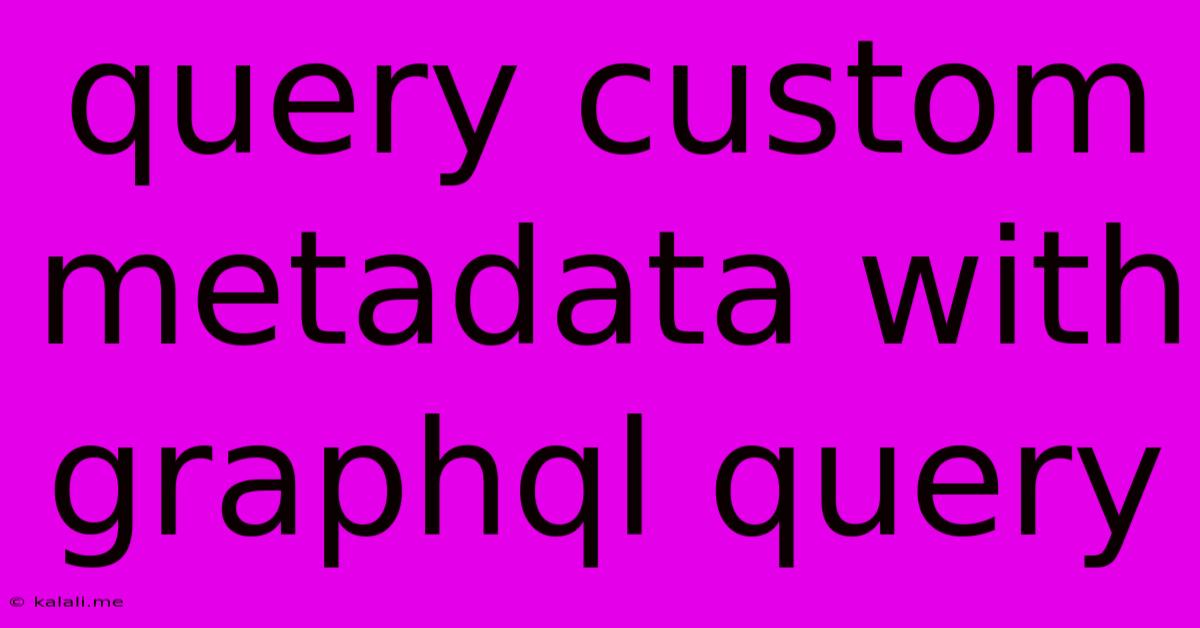Query Custom Metadata With Graphql Query
Kalali
May 26, 2025 · 3 min read

Table of Contents
Querying Custom Metadata with GraphQL Queries
This article explores how to effectively query custom metadata using GraphQL queries. We'll cover the fundamental concepts, provide practical examples, and discuss best practices for efficient data retrieval. Understanding this process is crucial for developers working with content management systems (CMS) or applications that rely on flexible data models. This guide will equip you with the knowledge to seamlessly integrate custom metadata into your GraphQL workflows.
Understanding the Basics
GraphQL's power lies in its ability to request only the data you need, eliminating over-fetching common in REST APIs. When dealing with custom metadata, this efficiency is amplified. Instead of retrieving entire data objects, you can specifically target the custom fields associated with your entities.
Custom metadata, often stored as key-value pairs or more complex structures, adds flexibility to your data model. Imagine a blog post; standard fields might include title and content, but custom fields could encompass things like authorEmail, publicationDate, or featuredImageURL. GraphQL allows you to elegantly access these fields with precisely targeted queries.
Structuring Your GraphQL Schema
The foundation for querying custom metadata lies in a well-defined GraphQL schema. Your schema needs to explicitly define the custom fields and their types. This ensures that your queries are type-safe and predictable. Let's consider an example for a BlogPost type:
type BlogPost {
id: ID!
title: String!
content: String!
authorEmail: String
publicationDate: Date
featuredImageURL: String
}
Here, authorEmail, publicationDate, and featuredImageURL represent custom metadata fields. Notice the use of appropriate scalar types (String, Date) to represent the data.
Crafting Effective Queries
Once your schema is defined, you can craft precise GraphQL queries to retrieve specific custom metadata. For instance, to fetch the title, author email, and publication date of a blog post with a given ID, you would use the following query:
query getBlogPost($id: ID!) {
blogPost(id: $id) {
title
authorEmail
publicationDate
}
}
This query demonstrates the power of GraphQL: it only retrieves the necessary fields, avoiding unnecessary data transfer. The $id variable allows for dynamic querying based on the specific blog post you need.
Handling Complex Custom Metadata
Custom metadata isn't always simple key-value pairs. It might involve nested objects or arrays. GraphQL handles this complexity with nested fields and list types. Consider a scenario where tags is a custom field containing an array of strings:
type BlogPost {
id: ID!
title: String!
tags: [String]
}
query getBlogPost($id: ID!) {
blogPost(id: $id) {
title
tags
}
}
This query efficiently retrieves the array of tags associated with the blog post.
Best Practices for Querying Custom Metadata
- Efficient Data Fetching: Always request only the necessary fields. Avoid over-fetching by carefully selecting the fields in your query.
- Schema Design: Invest time in designing a well-structured schema that accurately represents your data and custom fields.
- Variable Usage: Utilize variables to make your queries dynamic and reusable.
- Error Handling: Implement robust error handling to gracefully manage potential issues during data retrieval.
- Pagination: For large datasets, implement pagination to avoid overwhelming the client with massive responses.
By following these best practices, you can leverage the power of GraphQL to effectively query your custom metadata, building efficient and scalable applications. Remember, the key is precision—request exactly the data you need, when you need it.
Latest Posts
Latest Posts
-
How To Get Rust Out Of Clothing
May 27, 2025
-
Ground Wire Size For 200 Amp Service
May 27, 2025
-
Why Is Negative Times Negative Positive
May 27, 2025
-
A Is To B What C Is To D
May 27, 2025
-
Are The Front And Back Rotors The Same
May 27, 2025
Related Post
Thank you for visiting our website which covers about Query Custom Metadata With Graphql Query . We hope the information provided has been useful to you. Feel free to contact us if you have any questions or need further assistance. See you next time and don't miss to bookmark.